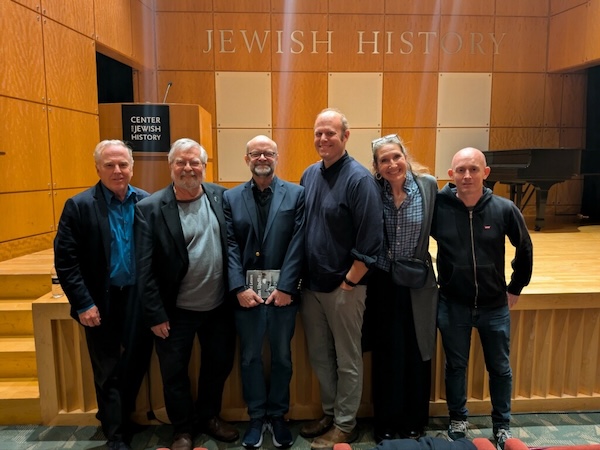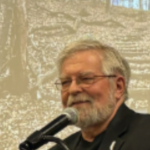 James Plath is best known to fellow Updike enthusiasts as president of The John Updike Society and an Updike scholar who edited two books of Updike interviews. But he’s also a creative writer, and after spending two weeks at Quarry Farm, the place where Mark Twain summered with his family for 20+ years, in addition to doing proposed research to write a comparative essay on how Twain modeled being both a celebrity and a writer for Updike, Plath felt compelled to write poems as well. The result: At Quarry Farm, a full-length collection published by Kelsay Books in 2025. He gave a reading on the campus of Illinois Wesleyan University, where he has taught American literature, journalism, creative writing, and film since 1988. The school’s student-run newspaper, The Argus, covered the event. Updike is mentioned in one of the poems.
James Plath is best known to fellow Updike enthusiasts as president of The John Updike Society and an Updike scholar who edited two books of Updike interviews. But he’s also a creative writer, and after spending two weeks at Quarry Farm, the place where Mark Twain summered with his family for 20+ years, in addition to doing proposed research to write a comparative essay on how Twain modeled being both a celebrity and a writer for Updike, Plath felt compelled to write poems as well. The result: At Quarry Farm, a full-length collection published by Kelsay Books in 2025. He gave a reading on the campus of Illinois Wesleyan University, where he has taught American literature, journalism, creative writing, and film since 1988. The school’s student-run newspaper, The Argus, covered the event. Updike is mentioned in one of the poems.
Category Archives: Society News
JUS Facebook Redux: Roth-Updike conference photos posted
John Updike Society members may recall that Facebook’s not terribly intelligent Meta AI shut down The John Updike Society and The John Updike Childhood Home pages for alleged “impersonation.” Other single author societies, Roth included, were also shut down. The Updike Society lost more than 10 years of posts and photos as a result. To share photos from last week’s Roth-Updike Conference in Greenwich Village, NYC, James Plath decided to slip a fastball under the chin and open another Updike Society account. Call it a Pop-up.
Here’s the link to the new Updike Society Facebook page for you to bookmark: https://www.facebook.com/profile.php?id=61582524401777
And here’s the link to the conference photo album (which you can find in the future by selecting the photos tab, then albums tab): https://www.facebook.com/profile.php?id=61582524401777&sk=photos_albums
Below is the planning committee, posing at the very last scheduled event . . . when there was nothing more to plan: (L to r) JUS veep James Schiff, JUS prez James Plath, co-director Adam Sexton, RS past prez Matthew Shipe, co-director Aimee Pozorski, and RS prez Andy Connolly.
Univ. of Glasgow student receives Updike Society research award
Ethan Hemmati, a second-year British-Iranian doctoral candidate in American Literature at the University of Glasgow in Scotland, was named as the recipient of the 2025 Robert M. Luscher Scholarship for travel to research collections for a project involving John Updike. Hemmati will receive $1000 from The John Updike Society to help defray the costs of travel to the U.S.
Hemmati, who previously engaged in masculinity studies at the universities of Durham and Cambridge, is working on a doctoral project titled “Adultery and Postwar American Fiction.”
“My project takes an intertextual approach to the fiction, life-writing, and biographies of three postwar American writers: John Updike, John Cheever, and Raymond Carver,” Hemmati wrote in his proposal. “My specific focus is on textual representations of infidelity across the writers’ fictional and nonfictional writings. As writers who wrote about adultery but were also adulterous themselves, the textual mediations of the subject throughout their art proves a compelling juxtaposition to its other representations within the writers’ (auto)biographical texts.”
One judge wrote, of Hemmati’s proposal, “It is detailed and nuanced, and it articulates a line of inquiry that I think is urgently important for Updike scholarship going forward. The recent revelations about Alice Munro’s daughter as well as such books as Claire Dederer’s Monsters: A Fan’s Dilemma suggest we might be at an inflection point around the very questions Ethan’s projects seeks at addressing—namely, how to engage with ‘art of a perceivably problematic nature, typically as a result of information about its creator or production.”
Hemmati previously made the short list for The Literary Encyclopedia Travel Award 2024.
Facebook suspends Updike Society accounts for “impersonation”
If you’ve been accustomed to getting your Updike Society and John Updike Childhood Home news through Facebook, you might want to bookmark our webpages for future use instead. Yesterday Facebook suspended both sites because it was determined that they were guilty of celebrity “impersonation.” This, even after an appeal.
Seriously? A non-profit literary organization largely composed of academics, along with a museum that’s on the National Register of Historic Places and has a Pennsylvania Historic Marker?
Clearly, Facebook “Meta” is more omnipotent than it is omniscient. 
Serbian TV spotlights Updike scholars
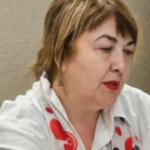 RTS, the Serbian public broadcast service, took note of two Serbian scholars of John Updike appearing on a panel at the recent American Literature Association conference in Chicago.
RTS, the Serbian public broadcast service, took note of two Serbian scholars of John Updike appearing on a panel at the recent American Literature Association conference in Chicago.
RTS interviewed Biljana Dojčinović and Nemanja Glintić for a segment that comes around the 18:55 minute mark in a Serbian-language for satellite TV broadcast all around the world.
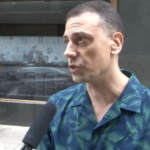 Dojčinović talked about what was covered in the panel on “Revisiting Olinger Stories (1964) at 60 and The Afterlife (1994) at 30: A Roundtable,” while Glintić talked about what it meant for his thesis-in-progress.
Dojčinović talked about what was covered in the panel on “Revisiting Olinger Stories (1964) at 60 and The Afterlife (1994) at 30: A Roundtable,” while Glintić talked about what it meant for his thesis-in-progress.
Here is the link.
Sylvie Mathé profiled in major interview
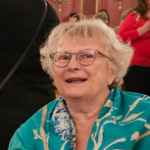 John Updike Society board member Sylvie Mathé was profiled in the series “Persistence of Character — Major interview: Archaeology of a journey” in e-Rea, electronic journal of studies on the English-speaking world. The series, published in French, tracks the breadth of an entire career of distinguished intellectuals, including early influences. An English translation exists in PDF form, but in a file to big to upload and no link to share. Here is the link to a French version online: “Sylvie Mathé: un entre-deux transatlantique (2024).”
John Updike Society board member Sylvie Mathé was profiled in the series “Persistence of Character — Major interview: Archaeology of a journey” in e-Rea, electronic journal of studies on the English-speaking world. The series, published in French, tracks the breadth of an entire career of distinguished intellectuals, including early influences. An English translation exists in PDF form, but in a file to big to upload and no link to share. Here is the link to a French version online: “Sylvie Mathé: un entre-deux transatlantique (2024).”
The interview begins with a list of career milestones:
1951 : Born in Étampes (91)
1968 : Baccalaureate A (Lycée de Pontoise, Val d’Oise)
1968-69 : American Field Service Scholarship (Rock Island, Illinois)
1969-72 : Higher Literature and Première supérieure (Lycée Fénelon, Paris)
1972-76 : École normale supérieure de jeunes filles (ENS-Sèvres)
1973-74 : Lecturer at Oxford (Lady Margaret Hall and St Anne’s)
1975 : Agrégation in English and CAPES in Modern Literature
1975-76, 1977-78 : Visiting Lecturer in French, Yale University
1980 : 3rd cycle thesis : “The everyday and the sacred in the fiction of John Updike” (under the direction of Jacques Cabau, Paris III)
1978-81 : Assistant-Professor in French, Wellesley College
1981-98 : Assistant Professor, then Lecturer, University of Provence
1997 : HDR (under the direction of Claude Fleurdorge, Montpellier III)
1998-2017 : Professor of American Literature, Aix-Marseille University
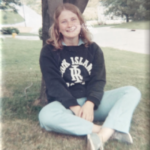 Mathé talks about the full trajectory of her career, including the experience of spending her senior year in high school in Rock Island, Ill. “Compared to my final year in French, the amount of work was nothing like it was, nor the demands of the homework,” she told the interviewer. She shared that her host family was “extremely puritanical,” with the mother “surprised, even horrified, that I had read texts by Hemingway, or Sanctuary by Faulkner…It must be said that 1968 in a small town in Illinois was still the 50s. It had nothing to do with what was happening on campuses at the same time, with women’s lib, demonstrations against the Vietnam War, for civil rights, etc.” In summary, “Let’s say that compared to my final year in French, or my life in France, which was essentially focused on high school, work and success, it was a much more varied life, more entertaining…I was doing things I had never done before: I was caught up in the rhythm, I went to matches according to the football, basketball, baseball seasons,” and she dated, went to parties where there was drinking and marijuana brownies, and was generally inducted into American culture.
Mathé talks about the full trajectory of her career, including the experience of spending her senior year in high school in Rock Island, Ill. “Compared to my final year in French, the amount of work was nothing like it was, nor the demands of the homework,” she told the interviewer. She shared that her host family was “extremely puritanical,” with the mother “surprised, even horrified, that I had read texts by Hemingway, or Sanctuary by Faulkner…It must be said that 1968 in a small town in Illinois was still the 50s. It had nothing to do with what was happening on campuses at the same time, with women’s lib, demonstrations against the Vietnam War, for civil rights, etc.” In summary, “Let’s say that compared to my final year in French, or my life in France, which was essentially focused on high school, work and success, it was a much more varied life, more entertaining…I was doing things I had never done before: I was caught up in the rhythm, I went to matches according to the football, basketball, baseball seasons,” and she dated, went to parties where there was drinking and marijuana brownies, and was generally inducted into American culture.
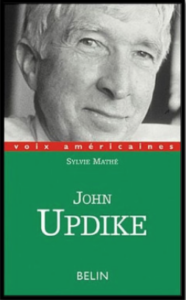 Mathé’s introduction to John Updike came when she went to Oxford and studied “Puritanism in John Updike’s Fiction” with Jeanne-Marie Santraud, “who was the only Americanist at Paris IV.” She would go on to write her master’s thesis on Updike and compose a monograph for the American Voices series edited by Marc Chénetier titled John Updike: Nostalgia for America.
Mathé’s introduction to John Updike came when she went to Oxford and studied “Puritanism in John Updike’s Fiction” with Jeanne-Marie Santraud, “who was the only Americanist at Paris IV.” She would go on to write her master’s thesis on Updike and compose a monograph for the American Voices series edited by Marc Chénetier titled John Updike: Nostalgia for America.
Updike “knew French,” Mathé says. “He came to France for a few months with his family. In several of his novels, for example in Couples, we find a character who prides himself on speaking French. Generally, it’s very funny because he misses the mark.”
Sue Norton appointed to the John Updike Society Board
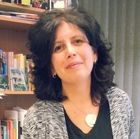 Sue Norton, Lecturer of English in the Faculty of Arts and Humanities, Technological University Dublin, Ireland, has accepted an invitation to join The John Updike Society Board of Directors. Her appointment is effective immediately.
Sue Norton, Lecturer of English in the Faculty of Arts and Humanities, Technological University Dublin, Ireland, has accepted an invitation to join The John Updike Society Board of Directors. Her appointment is effective immediately.
Sue has the distinction of having been named the first Updike Tucson Casitas Fellow (Project: “Somewhere Between Feminism and Misogyny: Classic Updike on the Modern Syllabus”). Her work has appeared in The Journal of Scholarly Publishing, The Irish Journal of American Studies, The John Updike Review, The Explicator, and other books and journals. She has co-edited two volumes of essays with Laurence W. Mazzeno: Contemporary American Fiction in the European Classroom: Teaching and Texts (Palgrave Macmillan, 2022) and European Perspectives on John Updike (Camden House, 2018).
“Sue has been an important voice in Updike studies,” society president James Plath said. “She has presented papers on Updike at numerous conferences and has become a valued colleague in the process. Sue has shown a willingness to become more involved and to contribute ideas to make the society stronger, and we’re very fortunate and quite happy that she’s agreed to serve on the board,” Plath said.
Sue came to Updike studies through her doctoral work on family in contemporary American fiction, which she completed in 2001 at University College Dublin. She has been a member of the Updike Society since 2016.
Society member to teach Updike stories in travel course
John Updike Society member Christopher Love, who directs American Writers in France study-abroad for The University of Alabama, said that he will teach Updike as one of the mid-20th century writers who resided in or traveled in France—a course he said will include James Baldwin and Jack Kerouac.
 Two stories that Love plans on teaching are “Museums and Women” and “Avec La Bebe-Sitter,” but he is asking members who have advice on additional stories or have useful knowledge about connections between Updike and France, French writers, French art, etc., to email him (cslove@ua.edu). Since many society members tend to like Hemingway as well, Love added that his new non-fiction book, Crimson Code: The Price of Success, will launch at an April 27 event at a Tuscaloosa, Ala. bookstore named Ernest and Hadley.
Two stories that Love plans on teaching are “Museums and Women” and “Avec La Bebe-Sitter,” but he is asking members who have advice on additional stories or have useful knowledge about connections between Updike and France, French writers, French art, etc., to email him (cslove@ua.edu). Since many society members tend to like Hemingway as well, Love added that his new non-fiction book, Crimson Code: The Price of Success, will launch at an April 27 event at a Tuscaloosa, Ala. bookstore named Ernest and Hadley.
Updike panels set for ALA 2024
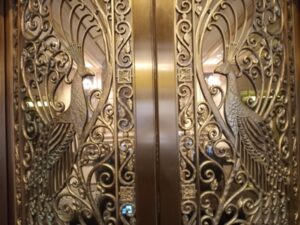 Chicago’s Palmer House will welcome back the American Literature Association Conference the end of May, once again opening its world-famous Tiffany peacock doors to scholars from all over the world.
Chicago’s Palmer House will welcome back the American Literature Association Conference the end of May, once again opening its world-famous Tiffany peacock doors to scholars from all over the world.
The John Updike Society will sponsor two panels:
Friday, May 24, 11:30 a.m.-12:50 p.m. Session 10-M “Revisiting Olinger Stories(1964) at 60 and The Afterlife(1994) at 30: A Roundtable” (Salon 6)
- Moderator: Sylvie Mathé, Aix-Marseille University, France
- Peter Bailey, St. Lawrence University, NY
- Biljana Dojčinović, University of Belgrade, Serbia
- Nemanja Glintić, Guangdong University of Foreign Studies, China
- James Plath, Illinois Wesleyan University
- Matthew Shipe, Washington University in St. Louis, MO
Saturday, May 25, 8:30-9:50 a.m. Session 16-J “The Witches of Eastwick: novel (John Updike, 1984) v. film (George Miller, 1987): A Roundtable” (Salon 7)
- Moderator: Adam Sexton, Yale University
- Edward Allen, University of South Dakota
- Carla Alexandra Ferreira, Federal University of São Carlos, Brazil
- Olga Karasik-Updike, Independent Scholar, Newbury, MA
- Robert Morace, Daemen University, Amherst, NY
- Takashi Nakatani, Yokohama City University, Japan
Here’s a link to the most recent draft program.
Technological University Dublin lecturer named 1st Updike Tucson Casitas Fellow
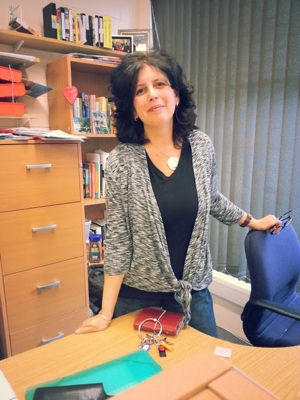 The selection committee for the John Updike Tucson Casitas Fellowship has chosen Dr. Sue Norton, Lecturer of English in the Faculty of Arts and Humanities at Technological University Dublin, to serve as the first fellow in residence.
The selection committee for the John Updike Tucson Casitas Fellowship has chosen Dr. Sue Norton, Lecturer of English in the Faculty of Arts and Humanities at Technological University Dublin, to serve as the first fellow in residence.
The Fellowship, which will be offered annually by The John Updike Society, consists of a $1000 honorarium and a two-week residency at the Mission Hill Casitas within the Skyline Country Club in Tucson, Arizona. Updike owned and wrote from the Casitas during a part of each year between 2004 and 2009. Located in the Catalina Foothills with a spectacular view of Tucson, the Casitas (pictured below) are owned by Jan and Jim Emery, who generously donated the two-week stay.
Robert M. Luscher, who oversaw the selection process, said the committee chose Norton because of the important contributions that her proposed projects make to Updike studies. During her residency, Norton will work on a critical essay (tentatively titled “Somewhere Between Feminism and Misogyny: Classic Updike on the Modern Syllabus”) and make initial progress on the proposal for an edited collection of essays to celebrate the centenary of Updike’s birth—a volume encouraged by the literary editor at Bloomsbury Publishing.
Norton, whose work has appeared in The Journal of Scholarly Publishing, The Explicator, The Irish Journal of American Studies, The John Updike Review, and other books and journals, previously co-edited two volumes of essays with JUS member 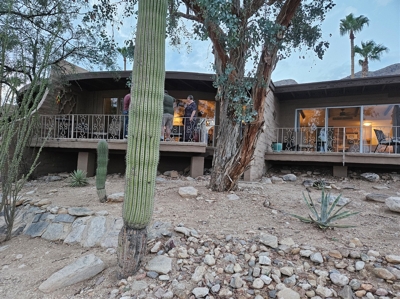 Laurence W. Mazzeno: Contemporary American Fiction in the European Clasroom: Teaching and Texts (Palgrave Macmillan, 2022) and European Perspectives on John Updike (Camden House, 2018). Norton came to Updike studies through her doctoral work on family in contemporary American fiction, which she completed in 2001 at University College Dublin. Her first article on Updike (The John Updike Review, 2014) was on the “regulating daughter” in the Rabbit novels. She has maintained an interest in the treatment of girls and women in Updike’s writing and beyond. It is on this topic that she will focus during her residency as the 2024 Fellow at the Tucson Casitas.
Laurence W. Mazzeno: Contemporary American Fiction in the European Clasroom: Teaching and Texts (Palgrave Macmillan, 2022) and European Perspectives on John Updike (Camden House, 2018). Norton came to Updike studies through her doctoral work on family in contemporary American fiction, which she completed in 2001 at University College Dublin. Her first article on Updike (The John Updike Review, 2014) was on the “regulating daughter” in the Rabbit novels. She has maintained an interest in the treatment of girls and women in Updike’s writing and beyond. It is on this topic that she will focus during her residency as the 2024 Fellow at the Tucson Casitas.
John Updike was one of only four writers to win the Pulitzer Prize for Fiction more than once. He was also among just a handful of Americans to be awarded both the National Medal of Arts and the National Humanities Medal, which are presented in White House ceremonies. He is widely know for his Rabbit Angstrom tetralogy, which fellow writer Ian McEwan said was his choice for Great American Novel. Updike also wrote poems, and many of the poems published in his final volume, Endpoint, were written at the Casitas.
Writer-scholar residencies in the U.S. are highly competitive and prestigious. Details on the 2025 fellowship and other grants offered by The John Updike Society can be found here.

